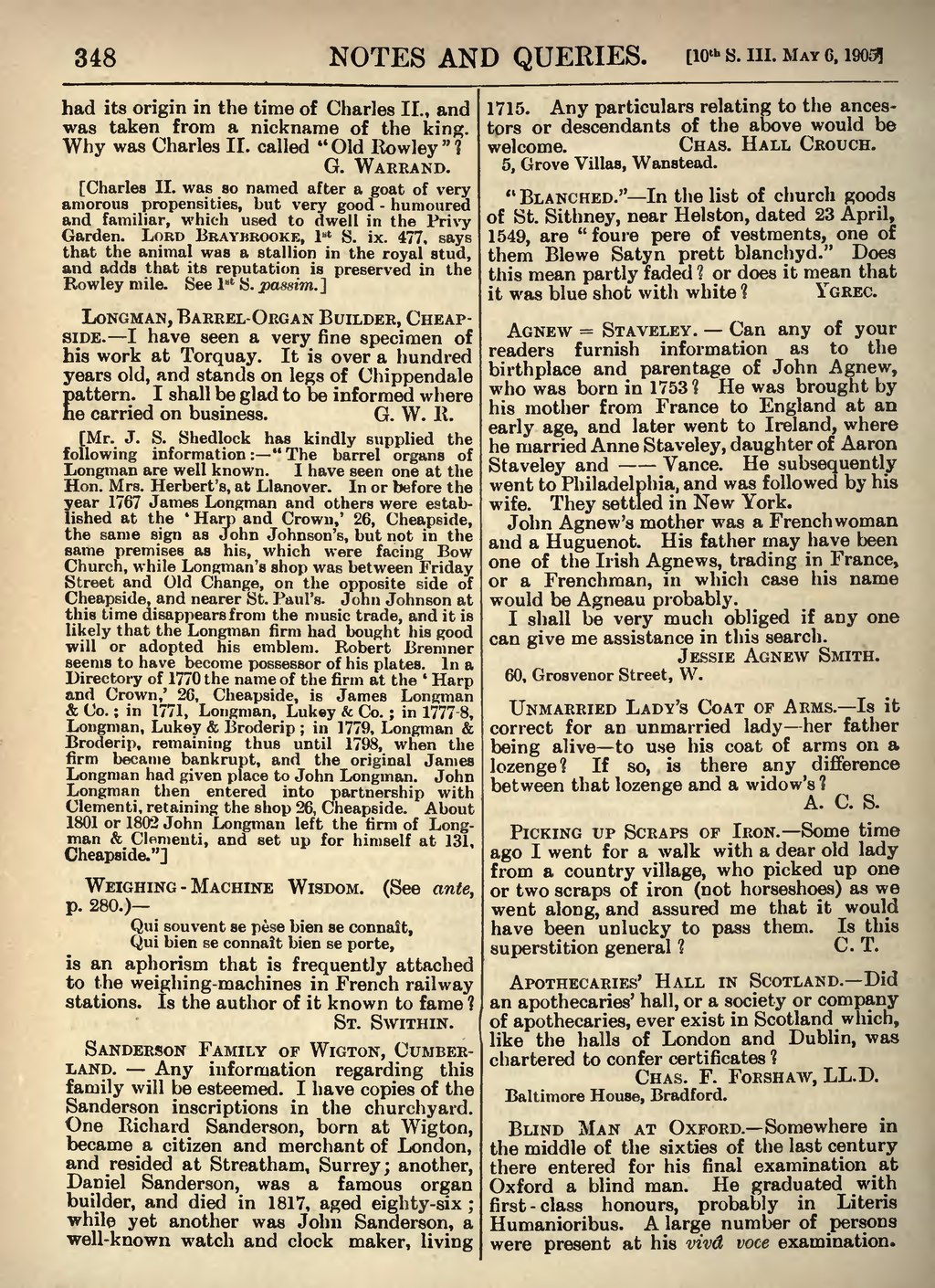348
NOTES AND QUERIES. [io* s. m. MAY 6,
had its origin in the time of Charles II., and
was taken from a nickname of the king.
Why was Charles II. called "Old Rowley'"!
G. WAREAND.
[Charles II. was so named after a goat of very amorous propensities, but very good - humoured and familiar, which used to dwell in the Privy Garden. LORD BRAYBROOKE, 1 st S. ix. 477, says that the animal was a stallion in the royal stud, and adds that its reputation is preserved in the Rowley mile. See 1 st S. passim.']
LONGMAN, BARREL-ORGAN BUILDER, CHEAP- SIDE. I have seen a very fine specimen of his work at Torquay. It is over a hundred years old, and stands on legs of Chippendale
Eattern. I shall be glad to be informed where e carried on business. G. W. II.
[Mr. J. S. Shedlock has kindly supplied the following information : " The barrel organs of Longman are well known. I have seen one at the Hon. Mrs. Herbert's, at Llanover. In or before the year 1767 James Longman and others were estab- lished at the ' Harp and Crown,' 26, Cheapside, the same sign as John Johnson's, but not in the same premises as his, which were facing Bow Church, while Longman's shop was between Friday Street and Old Change, on the opposite side of Cheapside, and nearer St. Paul's. John Johnson at this time disappears from the music trade, and it is likely that the Longman firm had bought his good will or adopted his emblem. Robert Bremner seems to have become possessor of his plates. In a Directory of 1770 the name of the firm at the ' Harp and Crown,' 26, Cheapside, is James Longman & Co. ; in 1771, Longman, Lukey & Co. ; in 1777-8, Longman, Lukey & Broderip ; in 1779, Longman & Broderip, remaining thus until 1798, when the firm became bankrupt, and the original James Longman had given place to John Longman. John Longman then entered into partnership with Clementi, retaining the shop 26, Cheapside. About 1801 or 1802 John Longman left the firm of Long- man & dementi, and set up for himself at 131, Cheapside."]
WEIGHING-MACHINE WISDOM. (See ante, p. 280.)
Qui souvent se pese bien se connait, Qui bien se connait bien se porte,
is an aphorism that is frequently attached to the weighing-machines in French railway stations. Is the author of it known to fame ?
ST. SWITHIN.
SANDERSON FAMILY OF WIGTON, CUMBER- LAND. Any information regarding this family will be esteemed. I have copies of the Sanderson inscriptions in the churchyard. One Richard Sanderson, born at Wigton, became a citizen and merchant of London, and resided at Streatham, Surrey ; another, Daniel Sanderson, was a famous organ builder, and died in 1817, aged eighty-six ; while yet another was John Sanderson, a well-known watch and clock maker, living
1715. Any particulars relating to the ances-
tors or descendants of the above would be
welcome. CHAS. HALL CROUCH.
5, Grove Villas, Wanstead.
"BLANCHED." In the list of church goods of St. Sithney, near Helston, dated 23 April, 1549, are " foure pere of vestments, one of them Blewe Satyn prett blanchyd." Does this mean partly faded 1 or does it mean that it was blue shot with white ? YGREC.
AGNEW = STAVELEY. Can any of your readers furnish information as to the birthplace and parentage of John Agnew, who was born in 1753 ? He was brought by his mother from France to England at an early age, and later went to Ireland, where he married Anne Staveley, daughter of Aaron
Staveley and Vance. He subsequently
went to Philadelphia, and was followed by his wife. They settled in New York.
John Agnew's mother was a Frenchwoman and a Huguenot. His father may have been one of the Irish Agnews, trading in France, or a Frenchman, in which case his name would be Agneau probably.
I shall be very much obliged if any one can give me assistance in this search.
JESSIE AGNEW SMITH.
60, Grosvenor Street, W.
UNMARRIED LADY'S COAT OF ARMS. Is it correct for an unmarried lady her father being alive to use his coat of arms on a lozenge 1 ? If so, is there any difference between that lozenge and a widow's 1
A. C. S.
PICKING UP SCRAPS OF IRON. Some time ago I went for a walk with a dear old lady from a country village, who picked up one or two scraps of iron (not horseshoes) as we went along, and assured me that it would have been unlucky to pass them. Is this superstition general ?
APOTHECARIES' HALL IN SCOTLAND. Did an apothecaries' hall, or a society or company of apothecaries, ever exist in Scotland which, like the halls of London and Dublin, was chartered to confer certificates 1
CHAS. F. FOESHAW, LL.D.
Baltimore House, Bradford.
BLIND MAN AT OXFORD. Somewhere in the middle of the sixties of the last century there entered for his final examination at Oxford a blind man. He graduated with first-class honours, probably in Literis Humanioribus. A large number of persons were present at his vivd voce examination.
